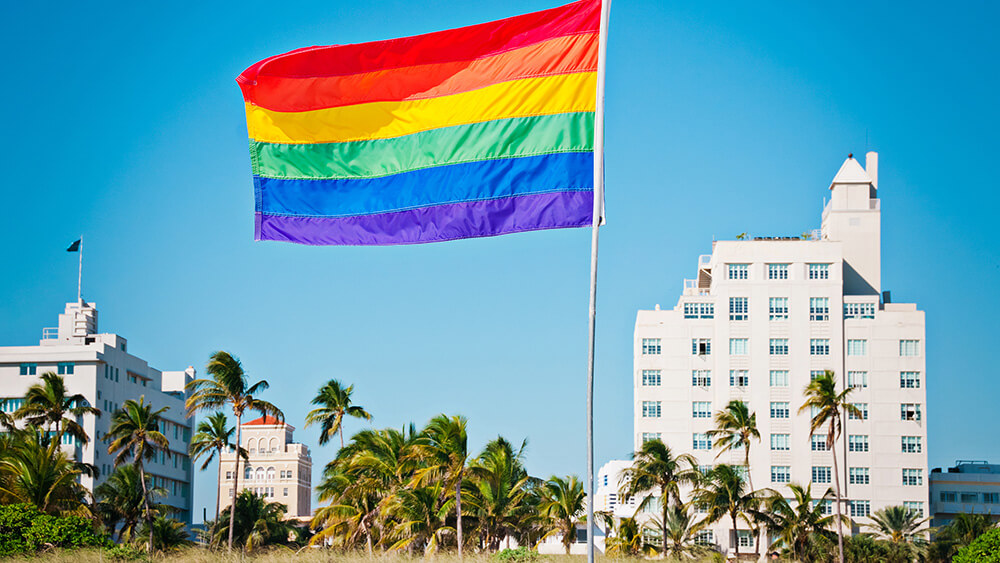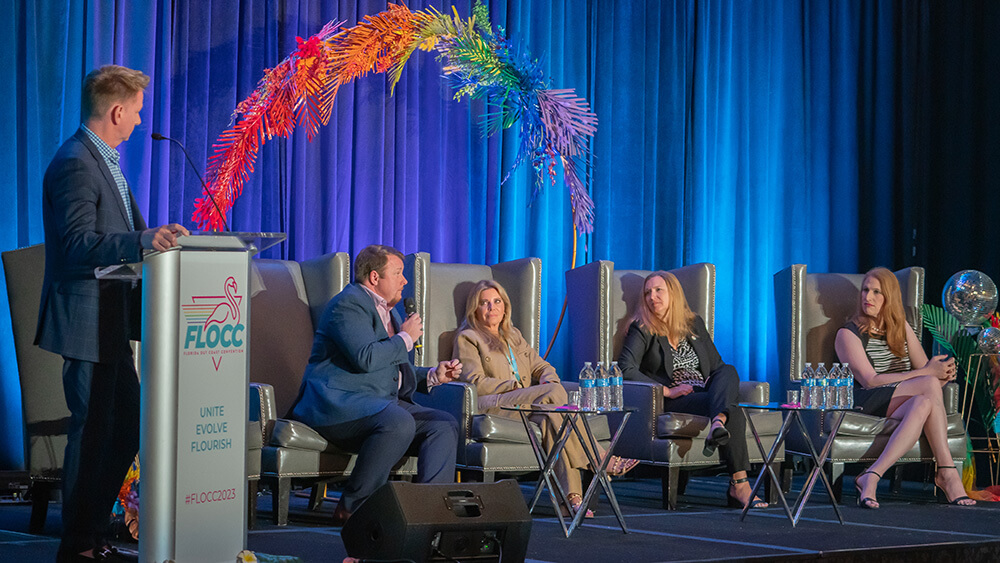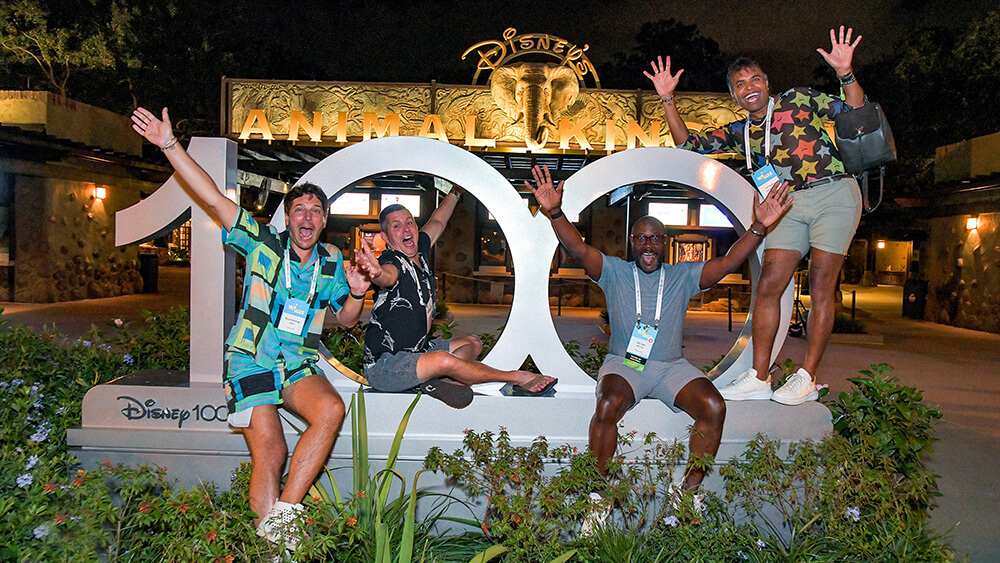
Organizations have been shifting away from boycotting, banning, or canceling their events in controversial destinations, and shining a spotlight on the issues.
In 2023, proposed and enacted laws targeting the rights of minority populations swept the U.S. in record-breaking numbers. According to the Human Rights Campaign, the nation’s largest lesbian, gay, bisexual, transgender, and queer (LGBTQ+) civil rights organization, more anti-LGBTQ+ bills were introduced in state houses last year than in each of the previous five years. And across the U.S., more than 70 anti-LGBTQ laws were enacted — another record.
Legislation limiting or eliminating women’s reproductive rights and access to abortion care also surged. Following the repeal of Roe v Wade in 2022, 58 bills were enacted in the U.S. — total bans, six- or 15-week bans, or other restrictions on abortion care, according to the Center for Reproductive Rights.
Meanwhile, an increasing number of states are proposing or passing laws hostile to people of color. Last year, the NAACP issued a travel advisory for the state of Florida after Gov. Ron DeSantis enacted five laws that banned the discussion of systemic racism in schools and prohibited institutions from spending federal or state dollars on DEI programs, among other actions.

Beth Surmont
In response, organizations have been shifting away from boycotting, banning, or canceling their events in affected destinations, and shining a spotlight on — rather than avoiding — the issues. These organizations are entering the fray in part because of a collective realization that travel boycotts, historically, have done little move to the needle politically. “Destination boycotts do not have the intended impact that people are hoping for,” said Beth Surmont, CMP, FASAE, CAE, vice president of event strategy and design for 360 Live Media, during the Jan. 8 Convening Leaders 2024 session, “When Politics and Values Collide: Navigating Potential Calls to Boycott a Destination.”
“Politicians don’t care anymore if you’re coming to their state or not — they care about votes,” Surmont said. In addition, she added, “a boycott is a passive experience. ‘I can’t go to that place because it doesn’t match my values’ — so then what? Nothing else happens. Are you writing a letter? Are you making a donation to a charity? Are you showing up and learning about the issue?”
Surmont said that actually convening in an affected destination enables participants to learn firsthand about the issues happening there. Organizers can give local speakers and/or local businesses impacted by the legislation a platform at their event to raise awareness. “What we have learned is that this is a new opportunity,” she said. “It’s more than just the political conversation — this is the chance for us as event organizers to make real local impact.”
That kind of thinking is behind California’s repeal last fall of a 2016 law that banned state-funded travel to dozens of destinations with discriminatory laws on the books. State Senator Toni Atkins, California’s first openly gay senate president, led the effort, naming the new bill the BRIDGE Project, standing for “Building and Reinforcing Inclusive, Diverse, Gender-Supportive Equality.” In addition to quashing the old travel ban, the new bill created a fund to support the LGBTQ community.
“[The 2016 law] had unintended consequences — limiting state travel for professors to conduct critical research, forcing public universities to find private funding to send student athletes to post-season games, and hampering our ability to help women and people needing to travel here from other states to receive reproductive and abortion care,” Atkins wrote in an op-ed for Teen Vogue last summer prior to the bill’s passing. “The BRIDGE Project carries a dual goal — open up California’s ability to get support and research to those states and open… hearts and minds… through this non-partisan, non-political project. To infuse hope where it feels like there is none.”

The inaugural Florida Out Coast Convention (FLOCC) last August featured several sessions sessions and discussions on LGBTQ travel.
Digging in
Across the country in Florida, publisher and event organizer Rachel Covello is working to do exactly that — infuse hope in a place where many have lost it. Last August, Covello organized the inaugural Florida Out Coast Convention (FLOCC), billed as the state’s first-ever convention dedicated to LGBTQ+ tourism. Covello said the idea for the event had been percolating in her mind after feeling disappointed by the lack of diversity both in conversation and representation at industry-related state conferences. Then when Florida enacted a flurry of discriminatory laws in 2023, setting off a wave of travel advisories, boycotts, and event cancellations, Covello said she knew it was the right time to go all in on the idea.
“It was apparent that we would need to… really focus on creating a space where we could help our tourism leaders… while amplifying the work of LGBT leaders in Florida at the same time,” said Covello, who spoke with Convene after FLOCC was held Aug. 1–3, 2023 at the Hilton Downtown Tampa Atrium.
In her community of LGBTQ people, she said, “there’s fear, there’s anger, there’s kind of a depression. We love living in Florida, but we’re not happy with what’s happening politically. This convention, I think for so many people, felt like this inclusive, safe space where people could have these conversations, and I feel like that hasn’t happened anywhere in Florida before, on that kind of level.”
FLOCC’s first edition — a second is planned for August 2024 in Coral Gables — drew close to 150 attendees, mostly from Florida-based DMOs, attractions, events, hotels, and marketing agencies. The program included several sessions and discussions on LGBTQ travel, like “The Value of LGBTQ+ Bars, Venues and Events on Tourism” and “Creating Transformative Experiences for Transgender Travelers.”
In the session, “Navigating Florida Tourism Advisories,” a legal expert broke down how tourism advisories — like the one issued last year by the NAACP — have affected Florida’s tourism and convention business. The goal was to be able to have conversations on what the advisories mean and what the travel industry can do about them, Covello said. “We still want to market our destinations as inclusive — how do we go about doing that and still attract meetings and groups in a state where there are either restrictions on coming to Florida or there is messaging saying, ‘You don’t belong here’? Because there are a lot of groups not coming to Florida.”
That’s a challenge Visit Lauderdale CEO Stacy Ritter, a panelist on that FLOCC session, has dealt with firsthand over the last few years. As of January2024, 18 conventions have backed out of meeting in her destination due to the political environment. However, some groups have chosen to dig in — even when it wasn’t easy. For example, the National LGBT Chamber of Commerce, which met in Fort Lauderdale in 2015 and 2021, received intense pressure from its corporate sponsors to switch destinations for its most recent meeting, Ritter told Convene during a phone interview.
“And [the organization] said, ‘No, this is [now] more important than ever that we go to places like Fort Lauderdale, which embrace us and support us, and we have to show everyone why you are only hurting the people who support your causes when you do that,’” Ritter said. “That was a big deal for us.”

Eventgoers kept the mood festive at Out & Equal’s 2023 Workplace Summit at Walt Disney World Resort in Orlando, Fla. (Out & Equal Workplace Advocates, all rights reserved)
Reactive to Proactive
Last year, Out & Equal — an organization dedicated to LGBTQ+ workplace equality — also refused to cancel or move its annual global Workplace Summit, held at Orlando’s Walt Disney World Resort in September. Some media interpreted the move as a way to align with Disney, which has publicly criticized DeSantis for his policies. Meanwhile, the American Occupational Therapy Association (AOTA) has held fast to its commitment to hold its INSPIRE Annual Conference and Expo, March 21–23, 2024 at the Orange County Convention Center in Orlando, even though some of its 10,000-plus attendees have voiced concerns.
“The fact is, the cultural and political landscape of every state in the country always has, and always will present conscience-weighing challenges,” said Charles H. Jeffers II, CDME, interim executive director at AOTA, in an op-ed he penned for The Orlando Sentinel this past October. “We disagree with Florida. That’s why we’re holding our conference there,” he wrote. “We understand that the threats of safety in Florida go beyond the silly ‘anti-woke’ rhetoric being peddled and grabbing headlines. We cannot control the microphone, but we can take measures to keep our attendees safe. Transportation, accommodation selection, and site security are very much in our control.”
AOTA hosted an open forum for registrants to discuss their concerns and “people connected the dots just like our team did,” Jeffers wrote. “Why punish Floridians for the actions of those in power?” The organization also worked with its local conference committee to support three Orlando-based charities. In addition to asking attendees to donate banned books to the Little Free Library for distribution, AOTA told Convene it will donate monies to Zebra Youth, which provides services to LGBTQ+ youth, and Quest, which provides services to people with developmental disabilities.
Higher Expectations
The actions of AOTA and other organizations choosing to meet in destinations with contentious legislation and make an impact mirror recent research indicating that people expect the companies and organizations they work for or engage with to be activists. According to the 2022 Edelman Trust Barometer, which conducted an online survey of more than 36,000 people in 28 countries, the majority of respondents expect leaders to be the face of change — for example, 65 percent felt strongly or had some expectation that CEOs “should inform and shape conversations and policy debates” when it comes to prejudice and discrimination.
The National Association of Councils on Developmental Disabilities (NACDD) chose to move forward with its Annual Conference and TA Institute in Orlando last summer, also finding ways to meaningfully engage with the local community. Robin Troutman, deputy director at NACDD and a panelist at the Convening Leaders session, shared that her team worked with Visit Orlando and local chambers of commerce to source on-site support and suppliers from affected communities, including photographers and speakers. Even after the NAACP travel advisory was issued last spring just a few months ahead of their event — prompting their board to seriously question whether to still meet in Florida — Troutman said they stuck to their decision.
“We had a conversation and we said, ‘We are being told on the one hand, this is not a good idea for us because it goes against our mission and our values. But on the other hand, if we do not go, then how are we promoting our mission to them?’” Troutman said. To get in front of criticism and questions, NACDD released a statement explaining its decision as well as the extra precautions taken at the event to ensure attendee safety, including setting up new policies around harassment, bullying, and discrimination. “We basically made it a safe zone,” Troutman said. “We just kept moving forward and it ended up being our most-attended event.”
Given that 2024 is an election year, there is speculation that even more problematic legislation will come up. That means event professionals need to shift from a reactive to a proactive mindset — regardless of where they’re meeting in the future, according to Surmont.
“If you’re not sitting right now with a letter that is ready to go out that explains the decision that your organization is making, you are already behind,” she told the Convening Leaders audience. “If you are a destination, if you aren’t sitting with a toolkit that shows how your destination is inclusive and is offering safety and the security needed for people to come to your destination, then you’re already behind. You needed those things, not yesterday, six months ago. You think it’s not coming for you — you are wrong.”
More Information
The Human Rights Campaign’s (HRC) Municipal Equality Index offers insight on what cities are doing to support the local LGBTQ+ community — “even where states and the federal government have failed to do so,” according to the HRC. See how U.S. cities scored in the organization’s 2023 index.
When Moving Is the Right Move
“Our mission and values don’t have asterisks to them — it doesn’t say, ‘We are here to serve this constituency except in Florida, except in Texas,’” said 360 Live Media’s Beth Surmont. “However, there are cases where it is not safe for certain groups or individuals to travel.”
Case in point — the Society for Maternal-Fetal Medicine (SMFM). Originally SMFM had scheduled its 43rd Annual Pregnancy Meeting in Grapevine, Texas, for early 2023. But when Texas passed a law in 2021 banning almost all abortions and allowing health-care providers who perform such care to be prosecuted, SMFM ultimately decided to move the 2,000-person meeting — which includes physicians and scientists involved in high-risk pregnancies — to San Francisco instead.
SMFM now requires a frustration of purpose clause in its annual meeting contracts, stating that “this clause allows SMFM to terminate a contract if the state enacts a particularly restrictive abortion law. A venue’s willingness to accept this clause, among the other factors mentioned, determines whether they are a viable option for the meeting.”
Jennifer N. Dienst is senior editor at Convene.
